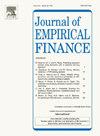Credit distortions in Japanese momentum
IF 2.4
2区 经济学
Q2 BUSINESS, FINANCE
引用次数: 0
Abstract
Persistent credit distortions have warped equity returns in Japan, where decades of subsidized bank credit to “zombie firms” suppressed momentum premiums. Controlling for zombies revives Japan’s momentum effect: momentum earns significant alpha after adjusting for zombies, and momentum’s expected return and Sharpe ratio triple. The zombie-adjusted factor commands a positive price of risk, becomes unspanned by other factors, and aligns more closely with international patterns. Why? Zombies depend on forbearance from their banks, and zombie losers’ outsized betas to bank returns depress momentum. Analysis of syndicated loan data confirms that firms with forbearance-prone lenders drive Japan’s persistently low momentum returns.
日本势头中的信贷扭曲
持续的信贷扭曲扭曲了日本的股票回报,在日本,数十年来银行对“僵尸企业”的补贴信贷抑制了动量溢价。控制僵尸恢复了日本的动量效应:在调整僵尸后,动量获得了显著的alpha,动量的预期回报和夏普比率是原来的三倍。僵尸调整后的因素具有正的风险价格,不受其他因素的影响,并且与国际模式更接近。为什么?“僵尸”依赖于银行的宽容,而“僵尸输家”与银行回报的巨大贝塔系数抑制了势头。对银团贷款数据的分析证实,有忍让倾向的贷款机构的公司推动了日本持续低迷的动量回报。
本文章由计算机程序翻译,如有差异,请以英文原文为准。
求助全文
约1分钟内获得全文
求助全文
来源期刊

Journal of Empirical Finance
Multiple-
CiteScore
3.40
自引率
3.80%
发文量
59
期刊介绍:
The Journal of Empirical Finance is a financial economics journal whose aim is to publish high quality articles in empirical finance. Empirical finance is interpreted broadly to include any type of empirical work in financial economics, financial econometrics, and also theoretical work with clear empirical implications, even when there is no empirical analysis. The Journal welcomes articles in all fields of finance, such as asset pricing, corporate finance, financial econometrics, banking, international finance, microstructure, behavioural finance, etc. The Editorial Team is willing to take risks on innovative research, controversial papers, and unusual approaches. We are also particularly interested in work produced by young scholars. The composition of the editorial board reflects such goals.
 求助内容:
求助内容: 应助结果提醒方式:
应助结果提醒方式:


